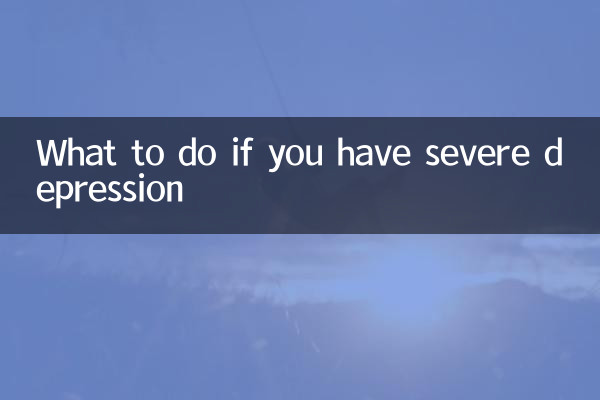What to do if you have severe depression
In recent years, depression has become one of the health issues of global concern. As social pressure increases and the pace of life accelerates, more and more people are troubled by depression, especially patients with severe depression, who need timely and scientific intervention and treatment. This article will combine the hot topics and hot content on the Internet in the past 10 days to provide you with a structured and practical guide.
1. Hot topics related to depression in the past 10 days across the Internet

| topic | heat index | Main discussion content |
|---|---|---|
| early signs of depression | ★★★★★ | Depression, loss of interest, sleep disturbance, etc. |
| Depression treatments | ★★★★☆ | Drug therapy, psychotherapy, physical therapy, etc. |
| Celebrity Depression Cases | ★★★☆☆ | Public figures share their antidepressant experiences |
| Social support for depression | ★★★☆☆ | How family, friends, and community can help |
2. Core symptoms of major depression
Major depressive disorder is different from ordinary depression. It is a serious mental illness that usually presents with the following core symptoms:
| Symptom type | Specific performance | duration |
|---|---|---|
| emotional symptoms | Persistent sadness, hopelessness, and feelings of emptiness | ≥2 weeks |
| cognitive symptoms | Difficulty concentrating, memory loss | long-term existence |
| somatic symptoms | Appetite changes, weight fluctuations, chronic pain | variable |
| behavioral symptoms | Social withdrawal, tendency to self-harm | gradual development |
3. 5 steps to scientifically deal with severe depression
1.Professional diagnosis: You must go to a mental health specialist hospital or the psychology department of a general hospital for evaluation and diagnosis by a professional doctor.
2.Systemic treatment: Usually the "drug + psychological" combined treatment model is adopted:
| Treatment | Specific content | efficient |
|---|---|---|
| drug treatment | Antidepressants such as SSRIs and SNRIs | 60-70% |
| psychotherapy | CBT, IPT and other therapies | 50-60% |
| physical therapy | transcranial magnetic stimulation, electroconvulsion | specific cases |
3.Social support system construction: Build a support network of family, friends, and medical staff.
4.lifestyle adjustments: Including regular work and rest, moderate exercise, healthy diet, etc.
5.long term management plan: Develop a personalized plan to prevent relapse.
4. Common misunderstandings about depression treatment
| Misunderstanding | facts | Hazard |
|---|---|---|
| "Just be more open minded" | It’s a disease that needs treatment | Delay in treatment |
| Drugs can be addictive | Standardize medication safety | refuse treatment |
| Treatment works immediately | It takes 2-4 weeks to take effect | give up too early |
5. Emergency handling
If the following situations occur, you need to seek medical treatment or call the psychological assistance hotline immediately:
• Persistent suicidal thoughts
• Specific suicide plan
• Severe self-injurious behavior
6. Prevention and rehabilitation suggestions
1. Regular mental health screenings
2. Develop stress-reduction skills (mindfulness, meditation, etc.)
3. Establish a healthy social circle
4. Maintain treatment compliance
Although depression is scary, most patients can achieve significant improvement through scientific treatment and systematic management. It is important to seek professional help promptly and avoid self-diagnosis and self-treatment. I hope this article can provide valuable reference for friends suffering from depression.

check the details

check the details